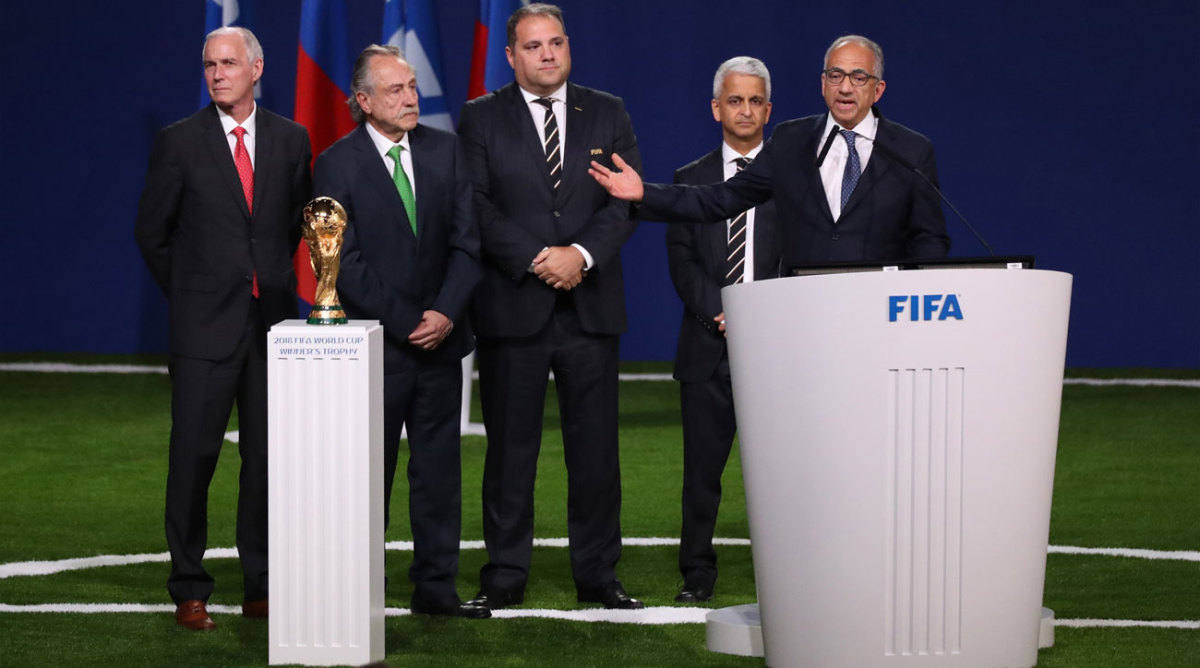World Cup Daily Podcast: USA's Joint 2026 Bid Wins; Spain Fires its Coach

The process wasn't always simple or straightforward, but the USA's joint bid with Mexico and Canada has won the right to host the 2026 World Cup.
The vote took place on the eve of the 2018 edition, and it was a sweet victory for a U.S. Soccer program that needed one after its men's team failed to qualify for this summer's competition in Russia. We give our thoughts on the vote win and its implications and the shocking decision from Spain to fire manager Julen Lopetegui on Day 2 of our daily podcast from the site of the World Cup. We're also joined by Ken Bensinger, author of the book "Red Card: FIFA and the Fall of the Most Powerful Men in Sports," to discuss the scandal-ridden organization and its tumultuous last few years.
Listen to the full episode below, and be sure to subscribe to our podcast on iTunes to hear each and every episode throughout the 2018 World Cup.
Here's a snippet from the conversation:
GRANT WAHL: The U.S.-led bid to host World Cup 2026 has won.
BRIAN STRAUS: In a landslide! Emphatically!
GW: In a landslide, not even close. And after the shame and surprise of losing to Qatar for World Cup 2022, the U.S. is back and hosting the World Cup with Mexico and Canada along for the ride, 10 games each. The U.S. getting 60 games, including every game from the quarterfinal onward. ... I was there in Zurich in 2010 when Qatar beat the U.S. and it felt shady, it felt corrupt, it felt like the people who were involved in that like Sunil Gulati and Carlos Cordeiro, it was a morgue-like state afterward. The opposite today, eight years a lot of things can happen.
BS: I think what happened, in 2010, the U.S. bid entered a game for which it did not understand the rules. That's clearly what happened, and they've admitted as such since then. And this time, I had a chance to chat with Sunil right after the vote ... He said that not only were some of the reforms and rule changes enough to convince the U.S. to bid again, obviously with Canada and Mexico, but it really made the difference in winning, and winning emphatically. What he said was not only producing technical report, but giving it teeth is what he called it, and reemphasizing it before the vote. Minutes before the vote they sort of posted again on the huge screen in the Congress center the parameters of the bids, the infrastructure that existed, they mentioned the obvious revenue discrepancies and they really kind of hammered home to the voters the World Cup is a technical undertaking and there really is no comparison between the two bids on this front.
Sunil also said the new rules banned gifts and developmental projects.
GW: That's huge.
BS: Not only gifts to potential voters but also the bidders offering to build a stadium in your country in exchange for your vote. And the public vote. We now know who voted for whom, so there can't be any shady promises made on that front.
All of these reforms not only were reaction to the 2010 vote for Qatar but also paved the way, I think, to the win today.
North America Wins World Cup 2026 Bid: How Each Country Voted
GW: That makes sense. When it comes down to it, U.S. Soccer has had a lot of bad news on the men's side at least in the last year, missing the World Cup here chief among them, but they really did need this to work out. And this is a really positive jolt of news. And now here's eight years where you can prepare for a World Cup in the United States, and in Mexico and Canada, there's a whole industry that's going to develop around this tournament.
I know a lot of people today who work in the soccer business who now feel like they're going to have a job for the next eight years, or at least the chance at getting a job because there's going to be a lot around that. More importantly, for the sport itself, on the field, host teams tend to do well. Not every time. But I asked Carlos Cordeiro today after they had won, does he think that U.S. Soccer, the men's national team will be in position to compete to win that World Cup, in 2026, and he sort of said yes. Not entirely said yes. He sort of hemmed and hawed for a second. But I'm not coming in and saying, "We're going to win the World Cup!" But at least put yourself in position to go on a deep run.
Christian Pulisic will be 27 years old at that point. Presumably there will be more quality players around him, and you hope that U.S. Soccer gets it together on the soccer said, and clearly MLS teams and development and all that stuff. Because clearly on the business side, things are doing quite well, but the balance has gotten out of whack between the business said and the player side.
That was one thing that sort of popped up to me today. One the one hand, the money aspect was probably a big reason why the U.S.-led bid got this World Cup. They're promising $11 billion in profits for FIFA for this World Cup, shattering every previous record. But I also sort of get a little queasy about the U.S. constantly being seen as this cash register for soccer.
Continue listening in the podcast above or download and subscribe to the podcast here.





